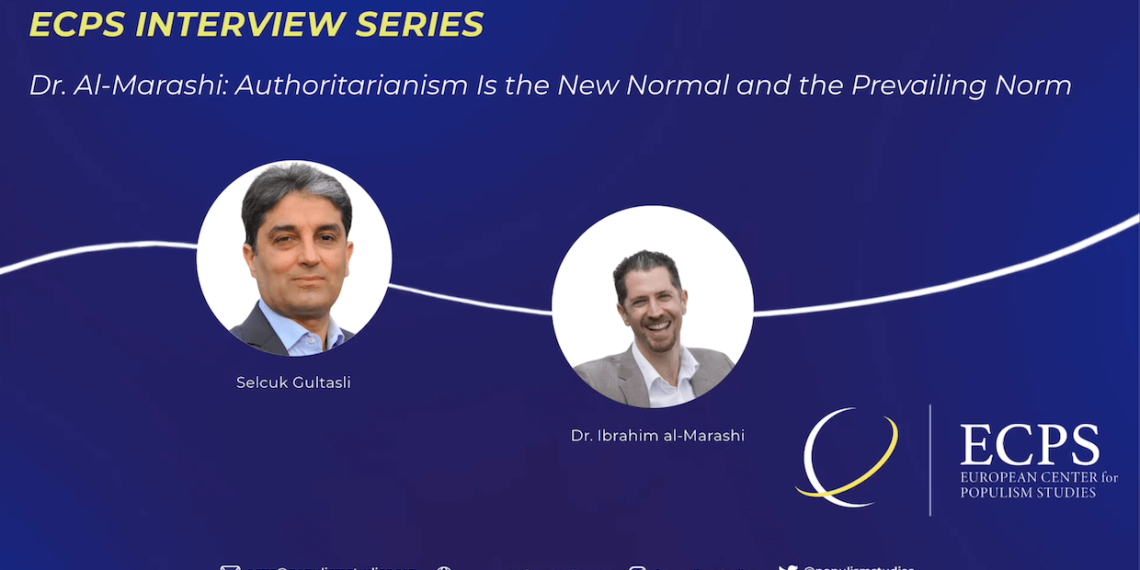In this timely and thought-provoking interview, Dr. Ibrahim Al-Marashi explores how authoritarianism has become “the new normal” in the Middle East amid a global retreat from democratic norms. Speaking to the ECPS, Dr. Al-Marashi analyzes the region’s complex landscape shaped by imperial legacies, resource politics, and shifting global alliances. He highlights how populist rhetoric, digital platforms, and transactional diplomacy—especially under Trump-era politics—are empowering authoritarian leaders and weakening democratic institutions. While civil society faces mounting repression, Dr. Al-Marashi suggests that digital activism and “artivism” may offer spaces of survival and resistance. This interview provides essential insight into how populism and authoritarianism intersect in the Middle East—and what that means for the future of governance in the region.
Interview by Selcuk Gultasli
In an era marked by the erosion of liberal democratic norms and the global resurgence of authoritarian tendencies, Dr. Ibrahim Al-Marashi—Associate Professor at Department of History, California State University, San Marcos—offers a timely and incisive analysis of the Middle East’s evolving political landscape. In an in-depth interview with the European Center for Populism Studies (ECPS), Dr. Al-Marashi argues that "authoritarianism has become normalized—it’s now the prevailing norm,” particularly in a world increasingly shaped by populist and transactional leadership.
Drawing from historical legacies and contemporary global shifts, Dr. Al-Marashi underscores how imperial interference and resource wealth have long laid the groundwork for authoritarian populism in the region. “Hydrocarbons enable political elites to generate revenue without relying on taxation,” he explains, allowing regimes to distribute wealth in ways that bypass democratic accountability and reinforce autocratic control. He connects this dynamic to broader regional patterns, noting that even militant groups such as ISIS have employed populist strategies by attempting to dismantle colonial-era borders and mobilize transnational support.
Dr. Al-Marashi highlights the impact of shifting global power dynamics, particularly the rise of multipolarity and the influence of Trumpism, in undermining democratic aspirations. With the US retreating from its rhetorical commitment to democracy, populist-authoritarian leaders find renewed legitimacy. “If the US is adopting these behaviors,” he argues, “this is the new norm—this is the future.” This sets a precedent for regimes that increasingly embrace personalistic and sultanistic rule, with little concern for liberal democratic values.
Transactional diplomacy, particularly under Trump, has also reshaped regional alliances. Dr. Al-Marashi notes that such diplomacy empowers authoritarian actors like Netanyahu, while simultaneously emboldening sectarian militias and weakening traditional state structures. “It’s a double-edged sword—quite literally,” he remarks, especially when it comes to balancing regional power plays and proxy conflicts in places like Syria, Iraq, and Yemen.
While the picture appears bleak, Dr. Al-Marashi also points to the resilience of digital resistance. He suggests that civil society and democratizing efforts may survive—if not flourish—through digital activism and what he terms “artivism.” In a region where the state has often failed to provide basic services, digital spaces may serve as the last frontier for democratic imagination and mobilization.
This interview captures the complexity of a region grappling with entrenched authoritarianism amid a globally permissive environment—and offers critical insights into how populist movements and power politics intersect in the 21st century Middle East.


